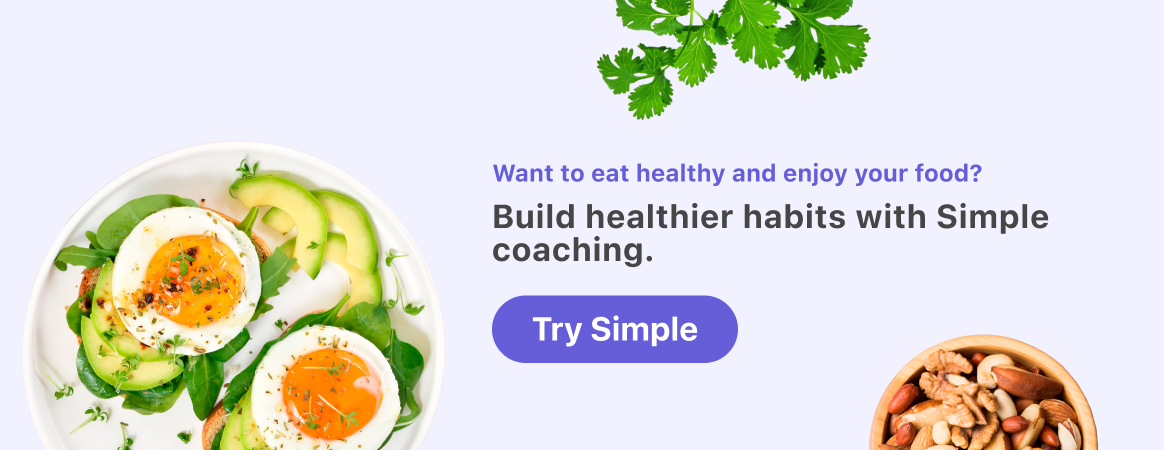What breaks a fast — the complete guide by Simple’s experts

You started intermittent fasting. (Congrats, that’s a rad move!)
It’s going pretty well, but sometimes you feel a touch hazy on the details. You worry if you’re doing it right and getting the full benefit.

For instance, you wonder whether your afternoon cup of tea breaks your fast.
Plus, one of your friends swears by bone broth, which you heard doesn’t take you out of ketosis, so does that mean it doesn’t break your fast?
And then there’s this thing called “bulletproof” coffee!? Is that fast-breaking, or nah?
Gee, this stuff can get confusing.
That’s where we come in. Let’s bring a Simple eye to the question of what breaks a fast.

First, let’s revisit what intermittent fasting means
Intermittent fasting isn’t a diet.
It’s an eating style that focuses on when you eat more than what you eat.
That said, the “what you eat” part matters too if you want intermittent fasting to help you transform your body and/or health. And, of course, the “what you don’t eat” part matters for our discussion of what will break a fast.
Let’s run through the various kinds of intermittent fasting to see how each one works.
As you consider the following approaches, keep these two factors in mind:
- You should always check in with your healthcare team before making any significant changes to your eating routine or lifestyle.
- Getting medical approval and support is especially necessary for more restrictive fasting schedules where you eat nothing or a limited amount of calories for 18+ hours.
Time-restricted eating (TRE)
TRE intermittent fasting schedules have specific daily timeframes.
For instance, with a 16:8 intermittent fasting schedule, all your food is eaten during an eight-hour window. For the remaining 16 hours of the day, you’re fasting.
Other popular TRE options include 12:12 and 14:10.
The 5:2 diet
The 5:2 diet takes a weekly rather than daily approach.
For five days of the week, you eat your regular diet. On the other two, you eat only 500/600 calories.
Given the hefty calorie restriction on those two fasting days, this schedule is one we don’t recommend without getting the green light from your doctor.
Alternate-day fasting (ADF)
Alternate-day fasting also takes a weekly approach. Here, you’d alternate a regular eating day with a fasting day that includes only 500/600 calories and keep rolling like that week by week.
As an even more fasting-forward approach than the 5:2 diet, ADF is another schedule we don’t recommend without medical approval.
Eat Stop Eat (ESE)
Eat Stop Eat is a schedule that has zero-calorie fast days. There are two of these a week, and each lasts 24 hours.
We’re getting into some pretty serious caloric restrictions here, and to put it lightly, twenty-four hours without food can be pretty rough on mind, body, and soul. We don’t recommend you try it without clearing it with your healthcare team first.
Water fasting
Water fasting means eating zero food for 24–72 hours (though some people do a water fast for longer). During this time, only water is allowed.
So, needless to say, it’s another one to strike from your list of options unless you have the support of your healthcare team.
Dry fasting
Dry fasting is a total fast, meaning no food and no drinks, including water. You can make TRE, 5:2, ADF, and ESE — any fasting method except water fasting, really — into a dry fast.
We really, really don’t suggest you try this approach. Bodies need water!! But if you’re considering it, your healthcare team definitely needs to be involved in both planning and execution.
If you haven’t already gotten your intermittent fasting journey underway, try our Simple quiz. We’ll recommend a schedule for you, so all you have to do is focus on fasting! Then, once you’ve done that, read our intermittent fasting for beginners guide for some extra tips.
So, what breaks an intermittent fast?
This is where things get interesting.
There are a few different perspectives on what breaks an intermittent fast.
In Camp #1, we have those who believe that as long as you stay in ketosis and what you eat doesn’t spike your insulin, you’re still fasting.
In Camp #2, we have those who believe that any amount of calories that gives your body energy that it can use breaks your fast.
We have some thoughts on this, but here’s the basic idea:
What breaks your fast really comes down to why you are fasting.
I fast for ketosis
Ketosis is the physiological state where our bodies use almost exclusively fat for energy. Our bodies start moving into this state around 8 to 12 hours after our last meal, depending on a few different factors (like how active we are).
To stay in ketosis, you can ingest energy, but it’s gotta be from foods that don’t trigger the release of insulin.
This is how some people can include MCT oil and bulletproof coffee in their fasting window and still consider their fast intact.
I fast to be truly fasted
Here, you’ll likely be following a TRE schedule where the goal during your fasting window is to consume zero calories.
You might do this to:
- learn about hunger
- have a clear break from eating
- explore the physiological experience of having zero energy coming in
- make fasting easier to stick to (for some, even a few calories can ramp up hunger)
To maintain a truly fasted state, all food and drink containing calories are off the menu.
So, what breaks a fast during this kind of intermittent fasting? Any food or drink containing any meaningful amount of energy.
Intermittent fasting experts are divided on what constitutes a “meaningful amount.” (Given that our bodies are different, we can reasonably expect that “meaningful” won’t look exactly the same for everyone anyway.)
Here’s our “erring on the side of caution” rule of thumb:
- Keep your calorie intake in the single digits.
A single cup of coffee with a splash of milk is cool during a fast, but go over that and you risk breaking your fasted state.
I fast to lower my calorie intake
Many people fast because it’s a simple way to eat fewer calories overall.
And some fasting schedules, like the 5:2 diet and alternate day fasting (ADF), allow a small amount of calories (around 500/600) during the fasting periods.
In both cases, foods and drinks that enable you to hit whatever calorie goal makes sense for you are fair game as part of your fasting window.
Our simple conclusion
While research shows you can get the benefits of intermittent fasting from both TRE methods and 5:2 / ADF,[1] there’s not really much evidence to suggest the more restrictive fasting schedules are more effective results-wise than our most recommended approach (TRE). Plus, what works for one person doesn’t always work for another, and a safe, effective fasting experience is about what works for you.
That’s why we always recommend consulting your healthcare team before starting your fast. They’ll be best placed to assess what will break a fast in your version of intermittent fasting.
For a rough and generalized benchmark:
- If you’re a TRE fan, stick close to zero calories to keep your fast intact.
- If you’re a 5:2-er or ADF-er, stay within your 500/600 calorie allowance, and you’re golden.
- If you’re just after ketosis, you can stay in ketosis while ingesting energy (so long as that energy is the non-insulin-triggering kind). You can fast or eat your way into ketosis; that’s how the keto diet is a thing. But this isn’t technically fasting. And that’s why fats like butter, coconut oil, ghee, etc., all — in our view — break a fast.
What can you drink while fasting?

Let’s get a handy-dandy list going here so you have a quick reference.
If you’re following a zero-calorie fasting method like 16:8, 14:10, and so on, these are your good-to-go, fasting-friendly drinks:
- water, and not just tap — sparkling and mineral are both fast-friendly too
- coffee and tea, ideally black, but a splash of milk in one cup is OK
- lemon water (other fruit infusions are available)
- up to two diet sodas per day (emerging evidence suggests that some artificial sweeteners may influence our blood sugars, but at this point, we’d say that two diet sodas are fairly solid ground)
- apple cider vinegar — a spoonful in a glass of water won’t affect your fast
If this has sparked your curiosity or raised more questions, get the full deets in our “What can you drink while fasting” guide.
To make sure you’re hitting your hydration goals during your fasting window, take our Simple quiz and get your hands on our hydration tracker (as well as a fasting buddy). We’ll send you reminders to drink, which can be your cue to get your H2O on!
If you’re on 5:2 or ADF, you can have calorie-containing drinks within your 500/600 calories. Still, we’d suggest getting most, if not all, of your calories from high-quality food. It’ll help you manage your hunger and cravings more and give you better energy levels.
What can you eat while fasting?
Again, this will depend on the type of intermittent fasting method you’ve chosen.
If you’re running with anything from 12:12 to 16:8, then it’s pretty straightforward:
Nada.
While you’re actually in your fasting window, remember the bottom line: calories break fasts.
If you’re doing 5:2 or ADF, you can eat 500/600 calories while fasting. It’s all part and parcel of your fast days.
Outside of your fasting periods, of course, you can eat all the things. Still, you may want to give some thought to what you eat here, too.
For the skinny on the best foods to:
- support your goals
- give you energy
- make you feel good
- help you manage your cravings
We bring you:
Our top 10 “what to eat during intermittent fasting” foods.
(Spoiler alert: It’s all the usual suspects like high-fiber carbohydrates, vegetables and fruits, nuts and other good fats … but maybe a few surprises too.)

Will supplements break your fast?
Supplements, like multivitamins, creatine, and branched-chain amino acids — anything you might take to supplement your diet and boost the amount of nutrients you’re getting — can feel like a puzzling area when it comes to fasting.
Do supplements break your fast or not?
Answer: it depends.
Let’s get into it.
Vitamin and mineral supplements
For vitamin and mineral tablets, check out what the manufacturer added to the party.
They may have added sugars to help bind the ingredients or make them easier on your palate. If it’s a gummy multivitamin, the sugar is right there in the gummy part (so easier to spot!).
If you spy calories or sugars in the mix, take the supplement during your eating window.
Sports supplements
You might use supplements to support your performance goals, like:
- protein powder
- branched-chain amino acids (BCAAs)
- essential amino acids (EAAs)
- collagen
- creatine
- electrolytes
- caffeine
Protein powder, BCAAs, EAAs, and collagen all have calories and would break you out of a fasted state.
Creatine, electrolytes, and caffeine do not, so they have no impact on your fast.
Fish or algae oil
There are about 10 kcal in a capsule, so if you’re taking one capsule a day, your fast is safe. If you’re taking the liquid kind, check your quantities (as fat is 9 kcal per gram, it can add up pretty quickly).
Probiotics and prebiotics
If you take these in capsule or chewable form, check the label for calories and added ingredients like sugar.
If you take them in the form of those teeny-tiny containers of yogurt … yup, you already know. Dinky they may be, but there are calories in ‘em all the same.
A reminder
For many supplements, food is an important factor when you’re taking them. Fat-soluble vitamins like vitamin D, for instance, need fat to be absorbed by the body.
Again, check the label. Does it say “take with food”? Stick to that and take it with a meal or snack.
What should you eat when it’s time to break your fast?

There will come a time — and some days it may feel like it’s been a LOOOOOOONG time coming — when you can intentionally break your fast and get to the business of eating.
It’s a good moment. [sighs contently]
What should you choose at this juncture to shift you back into eating mode again and set you up strong for the hours ahead?
We’d suggest three criteria.
- Eat something you enjoy.
- Choose foods that give you sustained energy (rather than a spike and a drop) and don’t trigger your cravings.
- Hit as many nutritional bases as possible — i.e., shoot for a mix of lean protein, veggies / fruit, whole grain carbs, healthy fats, and calcium-rich foods.
Frequently asked questions about what breaks a fast
Yes, 50 calories will break a fast if you’re doing time-restricted intermittent fasting, like 14:10 or 16:8.
No, 50 calories won’t break your fast if you’re doing 5:2 or ADF and you’re within your 500/600 calorie limit.
No, brushing your teeth does not break a fast.
The only time this might be true is if you’re doing a very extreme kind of dry fasting called “hard dry fasting,” which stipulates that you must have zero contact with water (or any other beverages). That’s not just not drinking water but not touching it in any way. (We’re not sure what happens if you get caught in the rain … )
Vitamins can break a fast if they have added ingredients that give them calories. They don’t always, though, so check the label.
You can put a splash (about a tablespoon) of milk in your coffee and not break your fast. For best results, aim to stick to one coffee with milk per fasting window. Black coffee is all good though; you can drink that freely (just stop before the caffeine jitters set in, and maybe switch to decaf in the afternoon [2]).

- Sun ML, Yao W, Wang XY, Gao S, Varady KA, Forslund SK, et al. Intermittent fasting and health outcomes: An umbrella review of systematic reviews and meta-analyses of randomised controlled trials. EClinicalMedicine. 2024 Apr;70:102519.
- Institute of Medicine (US) Committee on Military Nutrition Research. Pharmacology of Caffeine. National Academies Press (US); 2001.
